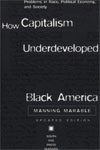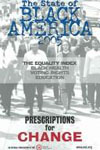|
ECONOMIC JUSTICE/FINANCIAL LITERACY SUNDAY
LECTIONARY COMMENTARY
Sunday, February 19, 2012
Wallace Charles Smith, Guest Lectionary Commentator
Senior Minister of Shiloh Baptist Church, Washington, DC
Lection – Proverbs 12:11-12 (New Revised Standard Version)
(v. 11) Those who till their land will have plenty of food, but those who follow worthless pursuits have no sense. (v. 12) The wicked covet the proceeds of wickedness but the root of the righteous bear fruit.
I. Description of the Liturgical Moment
The African American Lectionary sets Economic Justice/Financial Literacy Sunday within Black History month, establishing this day as an acknowledgment that economics and finances must not be ignored as components of healthy spirituality.
For the 2000+ years of Christian history, Greek philosophy has inordinately influenced Christian theology. From Christianity’s inception, Platonic dualism has infiltrated biblical interpretation, leading to a belief that only spiritual, i.e. non-corporeal, matters were truly real. Money and finances in such interpretations were not viewed as spiritual and therefore not integral to a complete life.
One version of contemporary Christianity, as expressed in some aspects of the health and wealth movement, spiritualizes money into something magical. This theology holds that money can be grown and finances improved by seeding blessings. A popular ritual in some of these health and wealth churches is throwing money on the altar to insure that one’s prayer requests are answered. It is reminiscent of the children’s fairytale, Jack and the Beanstalk, where the planting of a golden egg leads to the growth of the beanstalk that when climbed carries one to another reality. Such magical thinking is common for preschool children but in healthy, well-adjusted persons it (hopefully) dissipates as one matures.
Relegating finance and economics to magic is contrary to Judeo/Christian teaching. Biblical instruction on money is not only practical and common sense but basic to both Hebrew Scripture and New Testament writings.
II. Biblical Interpretation for Preaching and Worship: Proverbs 12:11-12
As wisdom literature, the book of Proverbs conforms to that genre of writing which contrasts wisdom and folly. Wisdom is the path which leads to joy and happiness and folly to unrighteousness and destruction. Proverbs 12, verses 11 and 12, direct the reader to the realities of righteous and unrighteous living as they pertain to fiscal matters. Verse 11 refers to working the land, which in an agrarian culture such as ancient Israel was farming, and constituted the primary livelihood of Israelite society. Properly working the land needed to be pursued with all seriousness, as it was the key to all life’s success. Those who followed trifles or empty things were mindless. Verse 11 says “those who follow worthless pursuits have no sense”; therefore they are poor stewards. Those who worked the land effectively had good sense and would enjoy an abundance of food: “Those who till their land will have plenty of food.” Conversely, verse 12 speaks of irresponsible stewardship as typified by envy or covetousness. The Hebrew for this verse is obscure but the basic premise is that God gives the righteous a firm rooting or hold on life, while those who desire what is in the net of another wind up with emptiness. Ultimately this text is of the same mind as that in 2 Thessalonians 3:10, which states, “those who won’t work won’t eat.” The practical implications of this are that moral responsibility is expressed through hard work, and is therefore the key to successful living. Worthless pursuits lead to financial ruin.
An underlying theme in this material that pertains to planting and harvesting is the idea of responsible stewardship. The word economics comes from the root oikos, which means our house. It pertains to the care and keeping of that which has been provided by God. The story of Adam and Eve in the Garden of Eden is rooted in God’s command to be wise in caring for those things that are God’s gifts, therefore the environment, crops, and animals. The term steward is used to translate that which in the Bible pertains to overseeing such things as possessions, business affairs, property, and servants. The term stewardship in the old English refers to the keeper of the sty, the sty warden. That person is the one who has the responsibility of seeing that the animals under supervision are cared for properly. The appropriate care of the animals in the pen leads to enhanced productivity and therefore economic health.
Fulfilling the biblical command to be fruitful and multiply is dependent upon proper stewardship, and a comprehensive understanding of the correct care of oikos (our house), our living environment. Proverbs 12 puts this stewardship into several categories. In verse 1, it is characterized by strictness or discipline. Education requires discipline and the intelligent pupil will understand this and submit willingly. Verse 9 states that the wise will not fritter away resources by attempting to keep pace with others. Verse 10 affirms that animals must be well cared for as they are the property on which a family’s wealth is based. Verse 11 states that success in all that one does in building wealth is constructed on hard work and sacrifice.
Responsible stewardship is too often under-discussed in African American Christianity. Post-slavery, we were promised 40 acres of land and a mule. While land grabs made thousands of acres of land available to white homesteaders, the promised 40 acres and a mule never materialized. Not only was that promise not fulfilled, but the rising Jim Crow laws after the Civil War and the realities of Reconstruction made the few advances by freed slaves evaporate into the clouds of political exigency.
Largely lost on history is the actuality of the economic clout slaves held in their villages and hamlets. They were the ones who were the smiths, the stable keepers, and the harness and saddle makers. Racism’s rise in the late 1800s saw even these skills evaporate as there were intentional efforts made to prevent the patronage and growth of black businesses.
Later in the post-world war worlds, blacks saw the property they held, largely their family farms with which they had survived slavery’s reconstruction and sharecropping’s evils, now wrested away from families for little or no recompense as the collapse of the agrarian economy drove blacks from the South to cities mostly in the North in search of work. The short of it is that several centuries of slave trade, reconstruction, and the collapse of America’s farming economy drove blacks to a position where, as other cultures built wealth sometimes through little more than homeownership, black economic power dwindled and the gap between blacks and whites escalated.
On this day devoted to economic justice and financial literacy, the material in Proverbs can be used to preach and teach the core principles of economic liberation. Those principles can be seen through Jesus’ ministry as voiced in Luke 4, which calls for a radical altering of society’s basic assumptions about the have and the have-nots of Jesus’ day. In Jesus’ first sermon he preached an economically prophetic principal. Although a Jewish rabbi, he chose the story of a Gentile woman, the widow of Zarapeth, who although impoverished was selected by Elijah to receive a blessing denied to the members of standard Israelite society.
Contemporarily, this lectionary day of economic justice/financial literacy is an ideal time to lift up principles of wealth building, such as home ownership and retirement investments. A number of programs, such as the American Baptist MMBB program, assist in the wealth building of retirees in religious professions, as does TIAA-CREF for those who work in education as a profession. These are but two examples of the many credible funds that protect retirement income.
In addition, this is a good Sunday to preach and teach investment in the African American community, promotion of national job and career counseling for youth, the expansion of income tax credits, and the promotion of a living wage rather than a minimum wage. It is also a good time for every pastor to decide to collaborate with at least one other church, and organizations with proven track records for economic uplift in his or her community, to begin making real strides toward economic literacy and empowerment for those they pastor.
Although Americans have become fond of dubbing the first years of the 21st century and the presidency of Barack Obama as indicators that we are living in a post-racial society, according to Pew Social Trends, in July 26, 2011 the median wealth of whites was 20 times that of blacks. There is still so much work to do and all that we do will be impacted by our level of financial literacy and our fight to obtain economic justice in the twenty-first century as African Americans. Given that America’s and the world’s economic houses are in disarray, the fight will be even harder as the economic plight of so many others is now also in shambles. So, if anyone in the African American faith community wonders what is our challenge for this century, our ancestors who had their land taken and their businesses outlawed or killed-off can give us the true and certain answer: “Teach our people to be financially literate, not depending on others, not even the government, and teach them how to fight for the economic justice that has for far too long evaded their grasp!”
Challenge
Too often historically, African American preaching has yielded to a celebration of the afterlife rather than the here and now. As Dr. Martin Luther King Jr. once described, it is a focus on the furnishings of heaven as opposed to a celebration of the here and now. The Rev. Dr. Jesse Jackson once stated in a sermon, “Religion is not just about by-and-by pie in the sky. It is also about preaching for some ham where I am.” This, then, is good news:“Those who till their land will have plenty of food, but those who follow worthless pursuits have no sense. The wicked covet the proceeds of wickedness, but the root of the righteous bear fruit.”
Descriptive Details
The descriptive details brought to mind by this passage include:
Sights: Farmers tilling land; an abundance of food; a lack of food for those who have followed worthless pursuits; wicked people coveting the proceeds of wickedness, such as shady bank deals to obtain homes, bad credit card deals, and pay-day loan schemes; the righteous accumulating and sharing their wealth; those with sad faces who have squandered their assets;
Sounds: The rustle of money being counted; the celebrations of those who have stolen and schemed to obtain wealth; the cries of the poor for food, shelter, and jobs; the voices of those shouting for economic justice; the sounds of teachers in classrooms teaching financial literacy; the cries of those who face their day of reckoning before God for having harmed and robbed the poor; and
Colors: The brown faces of the poor, the white faces of the poor; the dirty and dark feet of those sleeping outside; the colors of the picket signs of those who have grown weary of being economically mistreated.
III. For Further Reading
 |
Marable, Manning. How Capitalism Underdeveloped Black America: Problems in Race, Political Economy, and Society. Cambridge, MA: SouthEnd Press, 1999.
|
 |
Smiley, Tavis, ed. The Covenant with Black America. Chicago, IL: Third World Press, 2006.
|
 |
Shapiro, Thomas M. “The Racial Wealth Gap,” The State of Black America 2005: Prescriptions for Change. New York, NY: National Urban League, 2005.
|
|